Cannabis: A Plant With Many Faces
People who use, or would like to use, cannabis for medicinal reasons often have to fight prejudices. In this article, Sensi Seeds aims to demonstrate that medicinal cannabis users are perfectly normal people with life stories to tell. Today, we introduce five cannabis patients: five different faces, five varying fates, and one plant that helps. Read their stories for yourself.
The use of cannabis – whether for recreational or medicinal purposes – and its legal status are the subject of fervent global debate. Medicinal cannabis is increasingly being legalised, most recently in Oregon, Alaska and Washington D.C.. Legalisation gives chronically and seriously ill people access to a medicine that was previously unavailable to them. It gives them hope and assurance.
People who use, or would like to use, cannabis for medicinal reasons often have to fight prejudices. In this article, Sensi Seeds aims to demonstrate that medicinal cannabis users are perfectly normal people with life stories to tell. Today, we introduce five cannabis patients: five different faces, five varying fates, and one plant that helps. Read their stories for yourself.
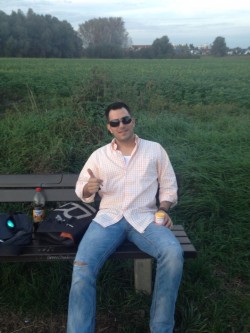
Chris Vrzak
The 36-year-old ADHD patient who lives in Hockenheim has survived two motorbike accidents that have left him with chronic pain in his knee, lower spine and shoulder.
He has been using cannabis since 1994. Chris first became aware in 2009 that it was possible to buy cannabis in Germany with a Certificate of Exemption. However he would never have thought it possible that he would one day be among Germany’s official cannabis patients. If he mentioned to doctors that the plant helped him and allowed him not to take medications with severe side effects, such as diclofenac, tilidine and other opiates, he was labelled as a drug addict and treated as such.
Chris has already been through a lot: his ADHD was either not treated or was treated incorrectly. From childhood, he was prescribed drops and tablets which a doctor fobbed the then 13-year-old off with, saying that everything would right itself when he reached puberty. The consequences: inability to pay attention, 1,000 thoughts in his head, quick to become irritable, aggression, poor concentration! Shortly afterwards, Chris tried cannabis for the first time and noticed that he was able to concentrate and thus complete his secondary school education. The doctor treating him diagnosed drug abuse, in his case cannabis addiction, and the youngster was prescribed diazepam, a psychotropic drug. There followed endless visits to a psychologist, drugs counselling and disruption to his education. After 13 years of heroin and cocaine dependency, two accidents and extreme burn-out in 2012, Chris managed to get his life back in order. Things started to improve when he changed his doctor, got the right diagnosis and was offered substitutes.
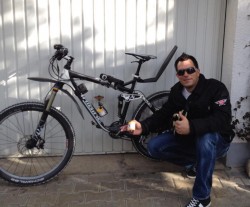
In 2013, he started the process of applying for a BfArM (Federal Institute for Drugs and Medical Devices) Certificate of Exemption. With the help of the renowned German private doctor Dr Franjo Grotenhermen – chairman of the Working Group on Cannabis as a Medicine (ACM) and managing director of the International Association for Cannabinoid Medicines (IACM) – Chris submitted his application for the approval of medicinal cannabis flowers to be supplied by a pharmacy. Without the support of Dr Grotenhermen, says Chris, it would have been completely impossible because every other doctor considered the use of cannabis to be addictive behaviour even though they themselves had to admit that it helped him every time he took it.
His application took just seven days from receipt of the documents to the permit being issued. Since October 2013, he has officially been permitted to use cannabis. To date, no other patient’s application has been processed so quickly! Chris believes this is because he had been known to the institute for eight years because of being prescribed substitutes containing L-Polamidon and Subutex.
Chris has a proactive approach to living his life. He is working towards independence with a focus on helping cannabis patients. He is currently building an information platform where visitors can find out all about healthy eating and a healthy lifestyle as well as cannabis as a medicine. He is interested in how the active ingredients in cannabis and other herbs and oils can be ingested to best effect. His own personal experiences and love of experimentation have led him to build a new vaporiser, the prototype of which is almost complete. Chris wants to emphasis this message to Sensi Seeds readers, and patients in particular:
Stay true to yourself! The journey is the reward! Find a doctor you trust and apply for a permit. Only through medicine will cannabis become legal in Germany!”
Tilo Clemeur
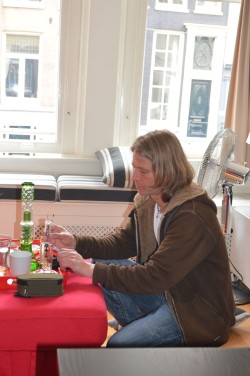
Tilo had suffered from epilepsy since he was 18. Orthodox medicines did nothing for him, leaving him only with severe side effects. The 44-year-old thus went in search of an alternative therapy. In 2000, he found out that cannabis could offer this alternative but when he told his neurologist about it, he was advised “not to let himself be made a fool of” because cannabis has no medicinal benefits.
Tilo went ahead and tried cannabis anyway. He took it as soon as he started to feel unwell. After a year free from attacks, he took the plunge and stopped taking the last of his conventional medications, successfully. Since then he has not suffered an attack for eight years.
He has had a certificate for medicinal cannabis flowers from his pharmacy since 2012. He previously took dronabinol. A resident of Duisburg, he was Germany’s first epilepsy patient to be granted a BfArM Certificate of Exemption to obtain cannabis flowers from his pharmacy.
For a year and a half, Tilo has been working as an editor for the magazine grow!, for which he interviews patients and relates their stories. He also raises awareness by giving talks at events such as the Cultiva Hemp Expo in Vienna and the Steam Parade in Cologne. He is highly critical that doctors are not permitted to simply prescribe cannabis without first requesting permission from the Federal Opium Agency, whereas other medicines, such as strong opiates for example, can be prescribed. Furthermore, many doctors are simply frightened to deal with cannabis as a medicine, much less prescribe it, because they don’t want to come into conflict with the law. His talks also touch on the immensely high cost of getting cannabis from a pharmacy: €74 for 5 grams, whereas home-grown cannabis would cost €2.20 per gram (for the first crop and the associated initial outlay) and €0.35 per gram thereafter! He wants to tell Sensi Seeds readers:
Fight for your right whether you are a patient or a recreational user. We know that the ban does nothing but harm. Lots of people lose their driving licence simply because they had a drag on a joint three days earlier. Patients are denied the opportunity to grow their own, even though there are constant disruptions to supply lasting weeks and forcing patients to look elsewhere. Make yourself heard and make it clear that we all have a right to cannabis.”
Claudia Russo
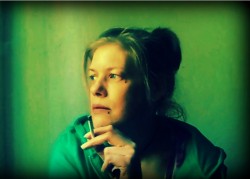
The 42-year-old, who has chosen to live in Berlin, is a widow with a grown-up daughter. She has a long list of ailments: hepatocyte hepatitis, an irregular heartbeat, cancer, chronic asthma, post-traumatic stress disorder (PTSD), osteochondrosis, polydirectional disc protrusion with vacuum phenomenon, spinal fractures, spinal column syndrome, spondylarthrosis, disrupted sleep due to pain, depression, chronic pain syndrome, abdominal cancer.
Claudia has officially been a cannabis patient since March 2014. However she was familiar with the plant before then. She had been using cannabis for years because it gave her support in many areas and calmed her mind. It took around six months for her to obtain permission to use cannabis. “The waiting, the suffering and the never-ending delays with letters made it feel like an eternity,” says Claudia.
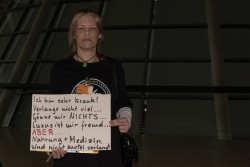
When she was diagnosed with cancer and the stem cell reconstruction treatment she received almost killed her, she desperately started to look for last resorts in alternative medicine. At a certain point, she came across a video about Rick Simpson oil. She looked into it and started to make her own. The results were astounding, but she found the substance unpalatable, so she began to further develop it, making oils for a wide range of uses. Claudia’s cancer is currently in remission. Cannabis is the only medicine she takes!
Claudia has a lot to say – to the doctors, to the health insurance companies and to her fellow human beings. And so despite her incapacity to work, she keeps busy volunteering. Work keeps her alive and distracts her from the pain. Claudia does acceptance-oriented drug work, advises ill people, the elderly, addicts and concerned parents and she has a small shop where she sells her own painted designs. She is very active in drugs policy and helps others in applying for permission to use medicinal cannabis flowers. Her message:
HEMP IS HOPE.. NOT ONLY DOPE”
Alexander Jähn
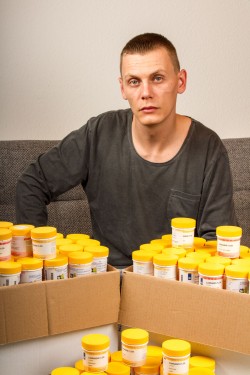
The 32-year-old German is married with one child. Alexander has been a cannabis patient since 2002 because of pain, paralysis and spastic cramps that are the result of a serious road traffic accident. Prior to the accident Alexander was a retail salesman, now he is unable to work.
Before he was officially permitted to use cannabis as a medicine, the doctors tried to control his pain with tilidine, morphine, tramadol, fentanyl and other medications. Having applied for medicinal cannabis flowers from the pharmacy, Alexander had to wait three months to obtain permission.
He was familiar with cannabis from his youth but it was only after he became ill that it occurred to him how much it really helps him. His message to Sensi Seeds readers is:
Herb is the Healing!”
Ralf Herrmann
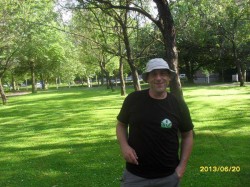
The 40-year-old from Heidelberg is a single father with a young daughter. Ralf takes cannabis for ADHD, a slipped disc and arthritis in his shoulder. Sensi Seeds had already introduced him previously in a portrait.
First Ritalin for ADHD, Vioxx, then tablets containing opiates for the pain and anti-depressants to held with his mood swings – Ralf refused them. He found this cocktail of medicines too dangerous. He smoked cannabis and was labelled an addict. Why did he do it? Because it was what made him feel the most well and he had his pain under control.
From 2001, Ralf was permitted to take dronabinol. His GP at the time prescribed it for him when other medications failed to help him effectively, and most importantly without any side effects.

In the summer of 2010 he became aware of cannabis flowers from the pharmacy via the ACM website. After finding a doctor prepared to support his application for an exemption, he took the first step. Following endless telephone calls, it took Ralf two months to obtain the BfArM Certificate of Exemption that allowed him to obtain cannabis from the pharmacy. However it took several years in total before he was permitted to use cannabis. He received his approval for medicinal cannabis flowers in December 2010 and is happy to have gone down the cannabis route. When he was granted his Certificate of Exemption, Ralf felt that he had finally been acknowledged by society.
In December 2010, there were approximately 60 patients considered to be untreatable and permitted to obtain cannabis from their pharmacist; today there are just under 300 such patients. Unfortunately, no Germany health insurance company will yet cover the costs of the medicine – patients are required to finance the costs of the cannabis themselves.
Ralf was one of the patients who appeared before the Administrative Court in Cologne in mid-2014 to fight for the right to grow their own cannabis. Unfortunately he was one of those whose claim to grow his own cannabis was rejected. But Ralf didn’t let it rest there – he submitted an appeal. His motto:
Legalise it worldwide.”
Ralf is a professional heating engineer but had been working as an IT systems engineer in recent years. Working out in the field, he had his own company car and operated independently while on the road. But he initially gave up his job for personal reasons.












No comments: